人教新目标八上unit 6I'm going to study computer science. 单元知识点复习课件(共27张PPT)
文档属性
| 名称 | 人教新目标八上unit 6I'm going to study computer science. 单元知识点复习课件(共27张PPT) | 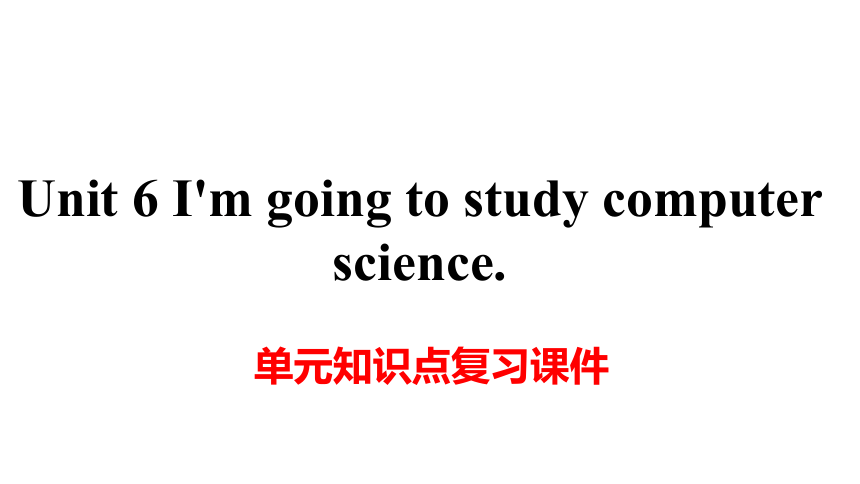 | |
| 格式 | pptx | ||
| 文件大小 | 1.1MB | ||
| 资源类型 | 教案 | ||
| 版本资源 | 人教新目标(Go for it)版 | ||
| 科目 | 英语 | ||
| 更新时间 | 2023-12-28 09:53:10 | ||
图片预览

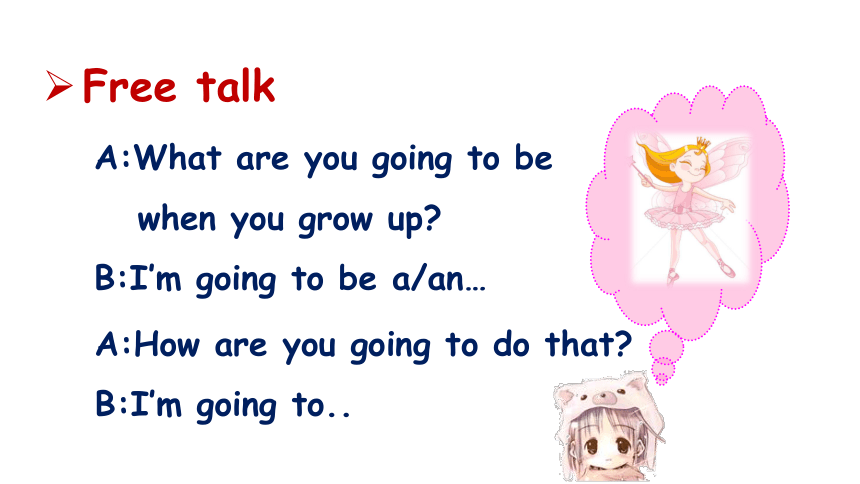
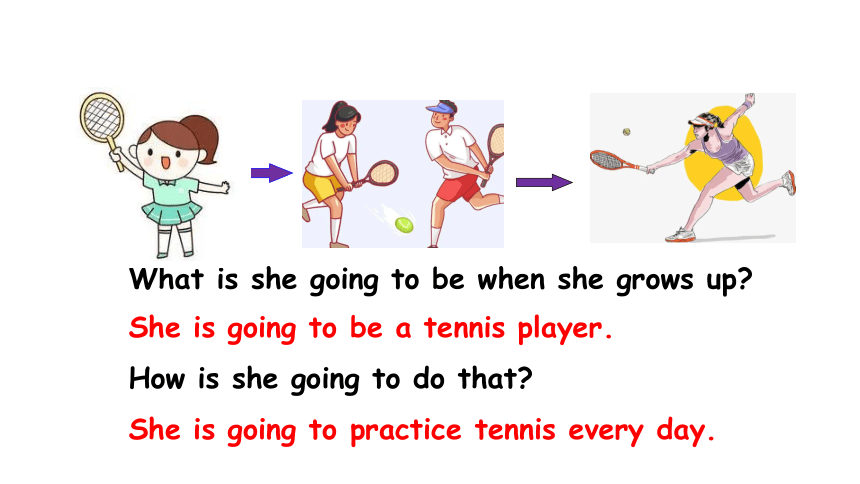
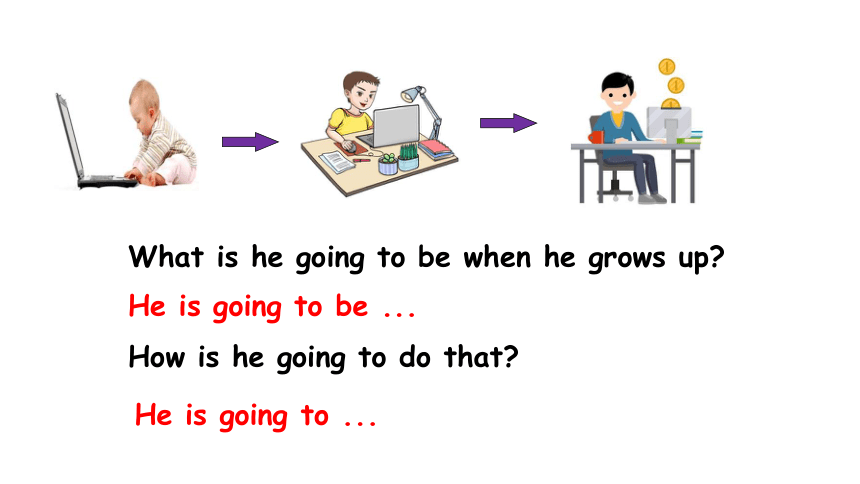
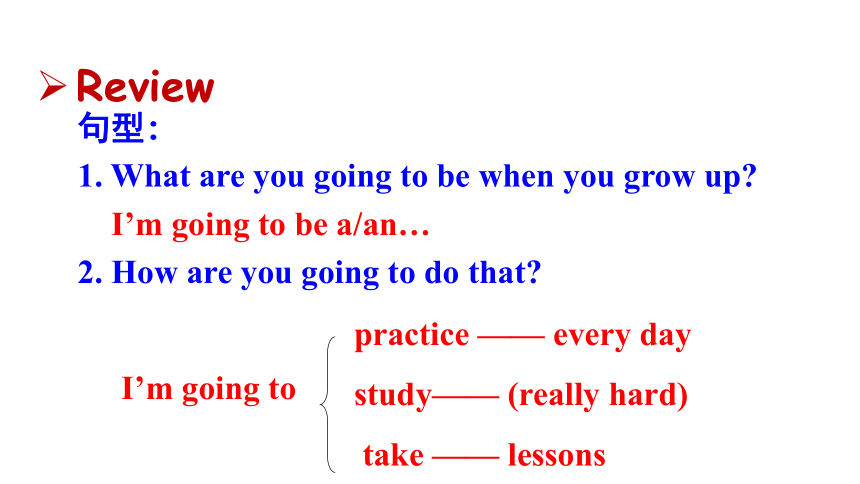
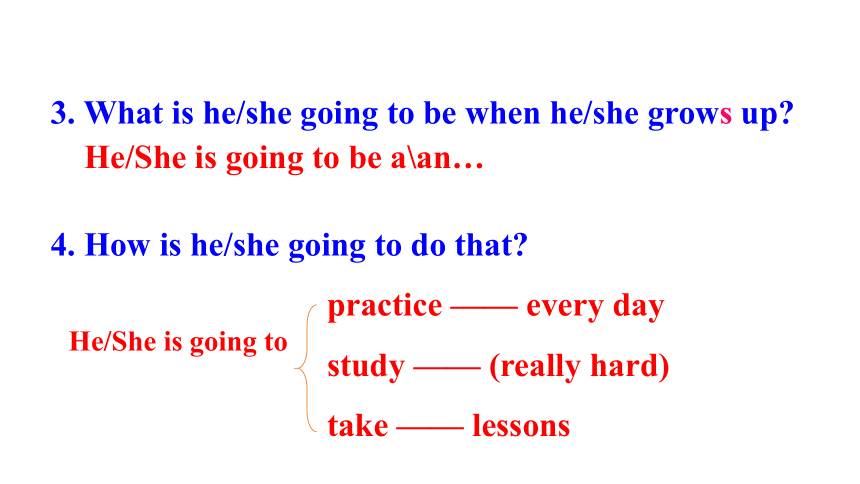
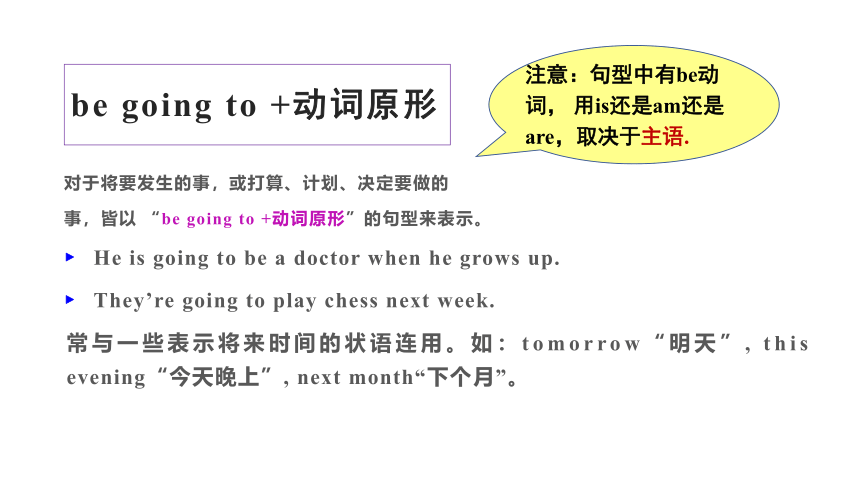
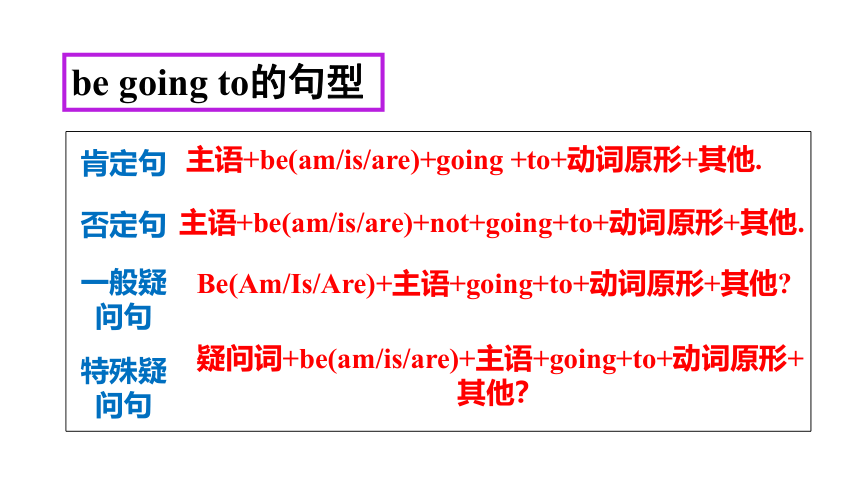
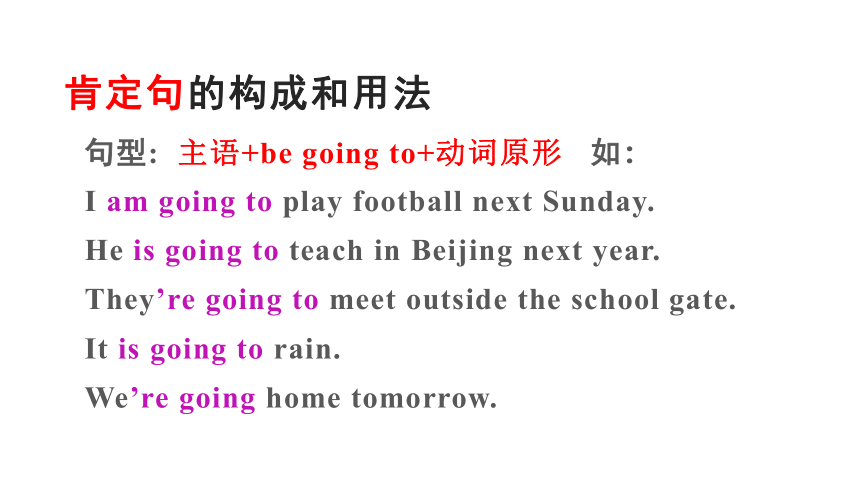
文档简介
(共27张PPT)
单元知识点复习课件
Unit 6 I'm going to study computer science.
A:What are you going to be
when you grow up
B:I’m going to be a/an…
A:How are you going to do that
B:I’m going to..
Free talk
What is she going to be when she grows up
She is going to be a tennis player.
How is she going to do that
She is going to practice tennis every day.
What is he going to be when he grows up
He is going to be ...
How is he going to do that
He is going to ...
句型:
1. What are you going to be when you grow up
I’m going to be a/an…
2. How are you going to do that
practice —— every day
study—— (really hard)
take —— lessons
Review
I’m going to
3. What is he/she going to be when he/she grows up
He/She is going to be a\an…
4. How is he/she going to do that
practice —— every day
study —— (really hard)
take —— lessons
He/She is going to
be going to +动词原形
对于将要发生的事,或打算、计划、决定要做的
事,皆以 “be going to +动词原形”的句型来表示。
He is going to be a doctor when he grows up.
They’re going to play chess next week.
常与一些表示将来时间的状语连用。如:tomorrow“明天”, this evening“今天晚上”, next month“下个月”。
注意:句型中有be动
词, 用is还是am还是
are,取决于主语.
肯定句
否定句
一般疑问句
特殊疑问句
主语+be(am/is/are)+going +to+动词原形+其他.
be going to的句型
主语+be(am/is/are)+not+going+to+动词原形+其他.
Be(Am/Is/Are)+主语+going+to+动词原形+其他
疑问词+be(am/is/are)+主语+going+to+动词原形+其他?
肯定句的构成和用法
句型: 主语+be going to+动词原形 如:
I am going to play football next Sunday.
He is going to teach in Beijing next year.
They’re going to meet outside the school gate.
It is going to rain.
We’re going home tomorrow.
否定句的构成和用法
句型:主语+be not going to +动词原形 如:
We’re not going to have any class next week.
It’s not going to rain this afternoon.
I’m not going to be a teacher.
He isn’t going to see his brother tomorrow.
They aren’t going to watch TV this evening.
一般疑问句的构成和用法
句型:be+主语+going to +动词原形?如:
Are you going to be a doctor in the future
Yes, I am.(肯定回答)/No, I’m not.(否定回答)
Is your sister going to bring you lunch
Yes, she is./No,she isn’t.
特殊疑问句的构成和用法:
句型:特殊疑问词+一般疑问句
How are they going to school tomorrow
By bike.
What is he going to do next Sunday
He is going to read books.
When are you going to buy a new bike
Tomorrow.
Where is the little girl going
She is going to her grandma’s home.
There be 表“将来有……”时用There be going to be
特别提醒
eg. There is going to be a sports meeting
tomorrow afternoon.
Ex.______________more people visiting here
next year.
A.There is going to have B.There be going to have
C.There is going to be D.There are going to be
Language points
1. What do you want to be when you grow up
长大以后你想做什么?
when此处用作连词,意为“当……时”,用来引导时间状语从句。在when引导的时间状语从句中,主语是一般将来时,从句要用一般现在时表示将来。
grow up意为“成长,长大”,grow的过去式是grew。
want to be“想要成为……” ,其后接职业名称。
2. How are you going to do that
I’m going to practice basketball every day.
我打算每天练习(打)篮球。
(1)这是一个be going to用于特殊疑问句的句子,
be going to用于疑问句中将be放在主语前。
be going to表示将要发生的动作,含有“计划, 打算”的
意思, 后跟动词原形。常跟表将来的时态连用。
(2) practice 作动词,表示“(不间断地)练习”,后可用名词作宾语,若跟动词时需用动名词形式。
He always want to practice his English with me.
他总想和我练习英语。
(3) everyday 意为“每天”,表示频率,在句中作状语,通常位于句末。
3.How are you going to do that 你打算怎么做?
be going to表示将要发生的动作,含有“计划, 打算”的意思,
后跟动词原形。常跟表将来的时间连用。
如: next Sunday下星期天, next month下个月, next year 明年等。
I am going to play football this afternoon.
我打算今天下午踢足球。
I’m not going to swim this Sunday.这个星期天我不打算去游泳。
4.The Old Man and the Sea by Hemingway.
海明威的《老人与海》。 此处介词by为“由……所著”之意。再如:a short story by Lu Xun (鲁迅的一部短篇小说)。
5. be sure about 确信;
be sure about sth /doing sth 确定某事或者确定干某事
You can be sure about their interest in it.
你可以肯定他们对这个很感兴趣。
6. make sure 确保;查明
I make sure he will come here.
7. try one’s best 尽最大努力
尽力干某事用: try one’s best to do sth
I’ll try my best to pass the exam.
8. Then you can be anything you want!
那么你就能当上你想做的人了。
此句的基本意思是you can be anything,不定代词anything指代未来所从事的某一职业,you want用来修饰anything。
9. at the beginning of this year 在今年年初
beginning n. 开头, 反义词为 end,结束。
at the beginning of 在……开始
at the end of 在……末尾
from the beginning to end 从头到尾
如:He will come here at the beginning of this month.
他会在这月初来到这里。
10. They are going to start an exercise program
or eat less fast food.
eat与have这两个动词都可以表示“吃”。
1) eat可用作及物或不及物动词, 是日常用语,但用在
日常口语中不够礼貌。让别人“吃”,通常用have。
Where shall we have our dinner
我们在哪儿吃饭?
2) 在美国, eat既作“吃”, 又作“喝”解。
如: We eat our soup first. 我们先喝汤。
3)have是普通用语, 同样可以表示“吃”,也可以表示
“喝”。用在非正式的文体中。如:
What time do you have supper 你们什么时候吃晚饭?
I do not have coffee in the evening. 晚上我不喝咖啡。
11. Some resolutions have to do with better panning… 有些决定与合理的时间规划有关……
句中planning 为名词,表示“计划、规划”如:city planning(城市规划)。better plan 意为:合理规划,指通过
制定计划来更加充分地利用时间、空间、精力。
2) Have to do with表示“与……相关;与……有关联或有
关系”如:
What dose this problem have to do with what we’re learning
today 这道题跟我们今天所学的内容有什么关系?
12. Sometimes the resolutions may be too difficult to
keep.有些时候这些决定可能会太难而无法实现。
1) 句中情态动词 may 表示推测,相当于汉语的“可能;也许;大概”的意思。如:
You may be right this time, but I’ m not sure.
这一次或许你是对的,但是我无法确定。
2) too…to…是一个固定结构,表示“太……而不能……”
The kid is too young to play this game.
这个小孩太小,不能玩这个游戏。
3) 句中的动词keep表示“履行(诺言等);遵守(惯例等)”如:
People hardly ever keep them!
人们很少履行它们(指计划)。
还有类似的用法:
keep a promise(信守承诺)
keep one’s promise (遵守承诺;说话算数)等。如:
We always keep our word. 我们说话是算数的。
1.这是我的个人意见。
This is my personal opinion.
2.你同意他的想法吗
3.我们的假期刚开始时,雨就整整下了3天。
It rained on and on for three whole days at the beginning of our holiday
翻译句子。
Do you agree with his idea
5. 他能帮你的忙。
He is able to help you.
4. 我的新年计划是改善我和家人还有朋友的关系。
My New Year’s resolution is improving my relationships with my family and friends.
6. 这次事故我是全部亲眼看到的。
I saw the whole accident with my own eyes.
单元知识点复习课件
Unit 6 I'm going to study computer science.
A:What are you going to be
when you grow up
B:I’m going to be a/an…
A:How are you going to do that
B:I’m going to..
Free talk
What is she going to be when she grows up
She is going to be a tennis player.
How is she going to do that
She is going to practice tennis every day.
What is he going to be when he grows up
He is going to be ...
How is he going to do that
He is going to ...
句型:
1. What are you going to be when you grow up
I’m going to be a/an…
2. How are you going to do that
practice —— every day
study—— (really hard)
take —— lessons
Review
I’m going to
3. What is he/she going to be when he/she grows up
He/She is going to be a\an…
4. How is he/she going to do that
practice —— every day
study —— (really hard)
take —— lessons
He/She is going to
be going to +动词原形
对于将要发生的事,或打算、计划、决定要做的
事,皆以 “be going to +动词原形”的句型来表示。
He is going to be a doctor when he grows up.
They’re going to play chess next week.
常与一些表示将来时间的状语连用。如:tomorrow“明天”, this evening“今天晚上”, next month“下个月”。
注意:句型中有be动
词, 用is还是am还是
are,取决于主语.
肯定句
否定句
一般疑问句
特殊疑问句
主语+be(am/is/are)+going +to+动词原形+其他.
be going to的句型
主语+be(am/is/are)+not+going+to+动词原形+其他.
Be(Am/Is/Are)+主语+going+to+动词原形+其他
疑问词+be(am/is/are)+主语+going+to+动词原形+其他?
肯定句的构成和用法
句型: 主语+be going to+动词原形 如:
I am going to play football next Sunday.
He is going to teach in Beijing next year.
They’re going to meet outside the school gate.
It is going to rain.
We’re going home tomorrow.
否定句的构成和用法
句型:主语+be not going to +动词原形 如:
We’re not going to have any class next week.
It’s not going to rain this afternoon.
I’m not going to be a teacher.
He isn’t going to see his brother tomorrow.
They aren’t going to watch TV this evening.
一般疑问句的构成和用法
句型:be+主语+going to +动词原形?如:
Are you going to be a doctor in the future
Yes, I am.(肯定回答)/No, I’m not.(否定回答)
Is your sister going to bring you lunch
Yes, she is./No,she isn’t.
特殊疑问句的构成和用法:
句型:特殊疑问词+一般疑问句
How are they going to school tomorrow
By bike.
What is he going to do next Sunday
He is going to read books.
When are you going to buy a new bike
Tomorrow.
Where is the little girl going
She is going to her grandma’s home.
There be 表“将来有……”时用There be going to be
特别提醒
eg. There is going to be a sports meeting
tomorrow afternoon.
Ex.______________more people visiting here
next year.
A.There is going to have B.There be going to have
C.There is going to be D.There are going to be
Language points
1. What do you want to be when you grow up
长大以后你想做什么?
when此处用作连词,意为“当……时”,用来引导时间状语从句。在when引导的时间状语从句中,主语是一般将来时,从句要用一般现在时表示将来。
grow up意为“成长,长大”,grow的过去式是grew。
want to be“想要成为……” ,其后接职业名称。
2. How are you going to do that
I’m going to practice basketball every day.
我打算每天练习(打)篮球。
(1)这是一个be going to用于特殊疑问句的句子,
be going to用于疑问句中将be放在主语前。
be going to表示将要发生的动作,含有“计划, 打算”的
意思, 后跟动词原形。常跟表将来的时态连用。
(2) practice 作动词,表示“(不间断地)练习”,后可用名词作宾语,若跟动词时需用动名词形式。
He always want to practice his English with me.
他总想和我练习英语。
(3) everyday 意为“每天”,表示频率,在句中作状语,通常位于句末。
3.How are you going to do that 你打算怎么做?
be going to表示将要发生的动作,含有“计划, 打算”的意思,
后跟动词原形。常跟表将来的时间连用。
如: next Sunday下星期天, next month下个月, next year 明年等。
I am going to play football this afternoon.
我打算今天下午踢足球。
I’m not going to swim this Sunday.这个星期天我不打算去游泳。
4.The Old Man and the Sea by Hemingway.
海明威的《老人与海》。 此处介词by为“由……所著”之意。再如:a short story by Lu Xun (鲁迅的一部短篇小说)。
5. be sure about 确信;
be sure about sth /doing sth 确定某事或者确定干某事
You can be sure about their interest in it.
你可以肯定他们对这个很感兴趣。
6. make sure 确保;查明
I make sure he will come here.
7. try one’s best 尽最大努力
尽力干某事用: try one’s best to do sth
I’ll try my best to pass the exam.
8. Then you can be anything you want!
那么你就能当上你想做的人了。
此句的基本意思是you can be anything,不定代词anything指代未来所从事的某一职业,you want用来修饰anything。
9. at the beginning of this year 在今年年初
beginning n. 开头, 反义词为 end,结束。
at the beginning of 在……开始
at the end of 在……末尾
from the beginning to end 从头到尾
如:He will come here at the beginning of this month.
他会在这月初来到这里。
10. They are going to start an exercise program
or eat less fast food.
eat与have这两个动词都可以表示“吃”。
1) eat可用作及物或不及物动词, 是日常用语,但用在
日常口语中不够礼貌。让别人“吃”,通常用have。
Where shall we have our dinner
我们在哪儿吃饭?
2) 在美国, eat既作“吃”, 又作“喝”解。
如: We eat our soup first. 我们先喝汤。
3)have是普通用语, 同样可以表示“吃”,也可以表示
“喝”。用在非正式的文体中。如:
What time do you have supper 你们什么时候吃晚饭?
I do not have coffee in the evening. 晚上我不喝咖啡。
11. Some resolutions have to do with better panning… 有些决定与合理的时间规划有关……
句中planning 为名词,表示“计划、规划”如:city planning(城市规划)。better plan 意为:合理规划,指通过
制定计划来更加充分地利用时间、空间、精力。
2) Have to do with表示“与……相关;与……有关联或有
关系”如:
What dose this problem have to do with what we’re learning
today 这道题跟我们今天所学的内容有什么关系?
12. Sometimes the resolutions may be too difficult to
keep.有些时候这些决定可能会太难而无法实现。
1) 句中情态动词 may 表示推测,相当于汉语的“可能;也许;大概”的意思。如:
You may be right this time, but I’ m not sure.
这一次或许你是对的,但是我无法确定。
2) too…to…是一个固定结构,表示“太……而不能……”
The kid is too young to play this game.
这个小孩太小,不能玩这个游戏。
3) 句中的动词keep表示“履行(诺言等);遵守(惯例等)”如:
People hardly ever keep them!
人们很少履行它们(指计划)。
还有类似的用法:
keep a promise(信守承诺)
keep one’s promise (遵守承诺;说话算数)等。如:
We always keep our word. 我们说话是算数的。
1.这是我的个人意见。
This is my personal opinion.
2.你同意他的想法吗
3.我们的假期刚开始时,雨就整整下了3天。
It rained on and on for three whole days at the beginning of our holiday
翻译句子。
Do you agree with his idea
5. 他能帮你的忙。
He is able to help you.
4. 我的新年计划是改善我和家人还有朋友的关系。
My New Year’s resolution is improving my relationships with my family and friends.
6. 这次事故我是全部亲眼看到的。
I saw the whole accident with my own eyes.
同课章节目录
- Unit 1 Where did you go on vacation?
- Section A
- Section B
- Unit 2 How often do you exercise?
- Section A
- Section B
- Unit 3 I'm more outgoing than my sister.
- Section A
- Section B
- Unit 4 What's the best movie theater?
- Section A
- Section B
- Unit 5 Do you want to watch a game show?
- Section A
- Section B
- Unit 6 I'm going to study computer science.
- Section A
- Section B
- Unit 7 Will people have robots?
- Section A
- Section B
- Unit 8 How do you make a banana milk shake?
- Section A
- Section B
- Unit 9 Can you come to my party?
- Section A
- Section B
- Unit 10 If you go to the party, you'll have a grea
- Section A
- Section B
